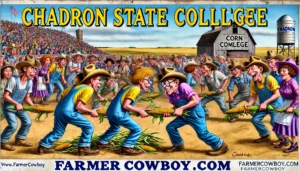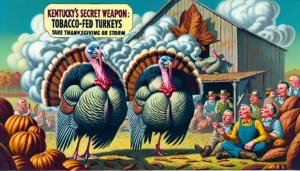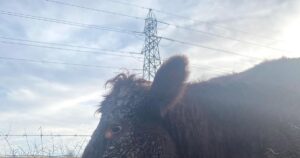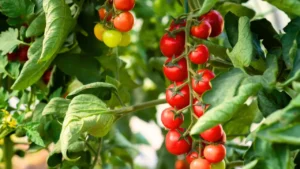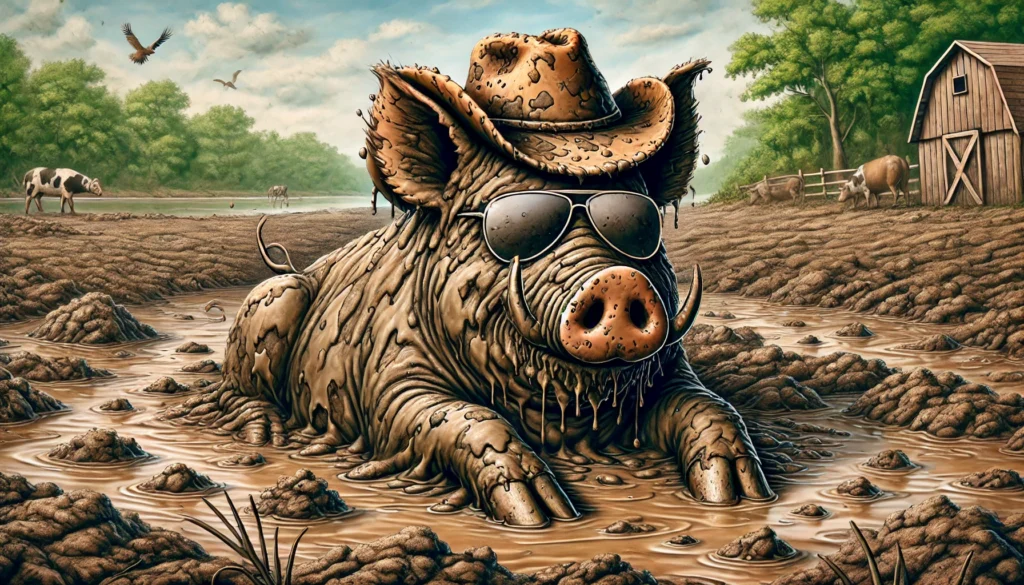
Hogs in Mud A wide aspect satirical highly detailed and vivid illustration in the style of farmercowboy.com . The scene shows a pig blending into its muddy surr7.webp.webp
Imagine this: a pig waddles out into the field, surveys the mud puddle with the kind of reverence reserved for sacred sites, and then, with the grace of a ballerina (if ballerinas had hooves and a penchant for rolling in filth), flops into the mud with a satisfying splat. That’s joy. That’s contentment. And that, dear readers, is what the human race has been missing.
Why spend thousands on therapy when all you need is a good roll in the dirt? Science has yet to catch up with pigs on this one, but anecdotal evidence suggests that wallowing in mud could be the ultimate stress reliever. Take, for example, the testimony of one local farmer, who swears by the healing powers of dirt. “I tried yoga, meditation, even a juice cleanse,” he said, wiping a streak of mud from his brow. “But nothing compares to a good, old-fashioned mud bath. Just ask my pigs—they’ve never been happier.”

The Psychological Benefits of Mud Therapy
Experts in animal behavior—those brave souls who’ve spent years observing pigs in their natural habitats (a.k.a. wallowing in mud)—have noted that pigs exhibit signs of extreme contentment when immersed in the squishy goodness of their favorite substance. One such expert, Dr. Wallow R. Trench, explains, “Pigs are naturally drawn to mud. It cools them down, protects their skin, and, quite frankly, they just love the way it feels between their toes. It’s like a full-body massage for them.”
Dr. Trench’s research shows that pigs in muddy environments display fewer signs of stress, have lower heart rates, and are generally more sociable. Compare that to the average human stuck in traffic, and you start to see why pigs might be onto something.
Public Opinion: Should We All Be More Like Pigs?
A recent survey conducted among Lubbock residents found that 62% of people would consider trying a mud bath if it promised to bring them as much happiness as it does for pigs. “I mean, why not?” said one respondent. “I’ve tried everything else. If rolling in the mud makes me half as happy as those pigs look, sign me up.”
However, not everyone is convinced. One skeptic, spotted hosing down his prized pig after a particularly enthusiastic mud session, remarked, “Sure, they’re happy now. But wait until they realize they’re covered in mud! Oh, wait… they don’t care. Never mind.”
The Economics of Mud
Pigs’ love for mud isn’t just a quirky trait; it’s also a surprisingly economical choice. While humans spend millions on luxury spas, pigs make do with whatever Mother Nature provides—usually a good rainstorm and a low-lying patch of dirt. This low-cost lifestyle has led some to speculate that pigs are secretly financial geniuses, maximizing happiness while minimizing expenses.
“You’ve got to admire them,” said local pig enthusiast Betty Lou Snortwell. “They’re frugal, they’re resourceful, and they’ve mastered the art of relaxation. We could all learn a thing or two from pigs.”

Anecdotal Evidence: Stories That Form a Connection
Ask any farmer worth their salt (or mud), and they’ll tell you tales of pigs and their legendary love for the stuff. Farmer Joe recounts the day his prize pig, Bacon, discovered the biggest mud puddle on the farm. “You’d think he’d struck oil,” Joe recalls. “He dove in like it was the fountain of youth, and to be honest, I’ve never seen him happier. He hasn’t looked back since.”
And it’s not just Bacon. Across the farm, pigs of all shapes and sizes have embraced the mud as their personal playground. From the littlest piglet to the grandest sow, each one seems to find pure joy in the simple act of getting dirty.
A Textual Analysis of Mud’s Appeal
Literature has long celebrated the joys of nature, but few have captured the allure of mud quite like the pigs of Lubbock. While Thoreau waxed poetic about the serenity of Walden Pond, pigs have been living their best lives in much messier surroundings. One could argue that pigs are the true transcendentalists, finding their own version of enlightenment in the earthy embrace of mud.
In fact, one local author, inspired by the pigs’ devotion to mud, has penned a new book titled “The Tao of Mud: Lessons in Happiness from the World’s Happiest Creatures.” Early reviews are already praising its deep insights and practical advice, though some readers have noted that it’s a bit… messy.
An Analogical Comparison: Humans vs. Pigs
Consider this: Humans chase happiness in all the wrong places—fancy dinners, exotic vacations, the latest tech gadgets—when all they really need is a good roll in the mud. Just as pigs understand the value of simplicity, so too could humans benefit from embracing the dirtier side of life. After all, pigs don’t worry about status or possessions; they find joy in the little things, like a cool patch of mud on a hot day.
One could even argue that pigs are the original minimalists. They don’t need much to be happy—just a bit of mud and maybe a few tasty snacks. Compare that to the average human, constantly striving for more, and it becomes clear who’s really winning at life.

Hypothetical Evidence: What If We All Tried It?
Imagine a world where, instead of chasing after the latest trends, people simply rolled in the mud whenever they felt stressed. Work deadlines? Roll in the mud. Relationship troubles? Roll in the mud. Global pandemic? You guessed it—roll in the mud.
This hypothetical scenario isn’t as far-fetched as it seems. In fact, some wellness gurus have already started promoting “mud therapy” as a way to reconnect with nature and find inner peace. And who knows? Maybe they’re onto something. After all, if it works for pigs, it might just work for us.
Insider Knowledge: Best Practices for Mud Rolling
For those brave enough to give it a try, here are some insider tips from the experts (i.e., the pigs):
- Location, location, location. Not all mud is created equal. Find a spot with the perfect balance of moisture and squishiness for maximum enjoyment.
- Timing is everything. Mud is best enjoyed after a good rain, when it’s fresh and cool. Avoid dry spells—they make for subpar wallowing.
- Embrace the mess. Don’t worry about getting dirty—that’s the whole point! Let go of your inhibitions and dive in headfirst.
- Bring friends. Wallowing is more fun in groups. Just ask any pig—they’re social creatures and love a good mud party.
- Keep it natural. Avoid artificial mud pits or fancy mud additives. The best mud comes straight from the earth, no frills needed.
Pro Tips: How to Achieve Maximum Pig-Style Happiness
- Start small. If you’re new to mud rolling, begin with a little puddle and work your way up to the big leagues.
- Accessorize. A good pair of mud boots can make the experience even more enjoyable—though true enthusiasts go barefoot.
- Set the mood. Play some relaxing music or embrace the natural sounds of the farm as you roll. It’s all about creating the right atmosphere.
- Document the experience. Share your mud adventure with friends and family—they’ll either be inspired or mildly concerned. Either way, it’s a win.
- Reflect on the experience. After your mud session, take a moment to appreciate the simple pleasures in life. You might just find that happiness was right under your feet all along.
Humorous Disclaimer:
No pigs were harmed in the making of this article, though several were observed having the time of their lives in the mud. Any resemblance to humans who find themselves inexplicably drawn to mud puddles is purely coincidental. This story is entirely a human collaboration between a cowboy and a farmer who firmly believe that happiness can be found in the messiest of places.
Originally Published at FarmerCowboy.com
2024-08-22 19:44:59
Karl Hoffman is a distinguished agriculturalist with over four decades of experience in sustainable farming practices. He holds a Ph.D. in Agronomy from Cornell University and has made significant contributions as a professor at Iowa State University. Hoffman’s groundbreaking research on integrated pest management and soil health has revolutionized modern agriculture. As a respected farm journalist, his column “Field Notes with Karl Hoffman” and his blog “The Modern Farmer” provide insightful, practical advice to a global audience. Hoffman’s work with the USDA and the United Nations FAO has enhanced food security worldwide. His awards include the USDA’s Distinguished Service Award and the World Food Prize, reflecting his profound impact on agriculture and sustainability.
